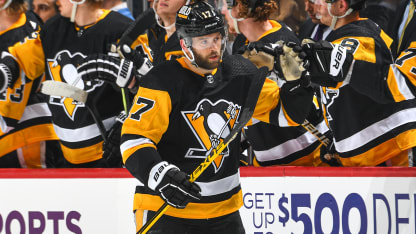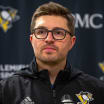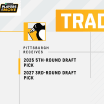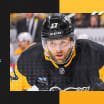Rust Continuing to Evolve His Game

"I was always the guy where it was like, well, he's got potential," Rust said. "He's got potential to be a third or fourth-line guy with energy, with speed. And I took that and I put it in the back of my mind and said, I got to prove these people wrong."
Now, exactly 400 games into his NHL career, Rust has blown everyone away with the body of work that he's put together. Not only is he a two-time Stanley Cup champion who has come up clutch on the biggest stage - Rust has developed into a first-line winger who is set to reach the 20-goal mark for a third consecutive season.
Among players who skated in their first 400 games with Pittsburgh, Rust's 257 points (119G-138A) through 400 career games are the seventh-most.
"When I look back on my experiences, I can't think of another guy that has developed his game as much as Rusty has," head coach Mike Sullivan said. "He deserves so much credit for maximizing his potential and his work ethic to continue to grow his game. I can't say enough about Rusty and what he brings to this team and the person that he is. He's a terrific person. He's a great teammate. But he is one hell of a hockey player."
And what makes his story even more special is that Rust has made this happen for himself.
He doesn't have a trainer he works with in the summers, and never has. Instead, when Rust returns to Sault Ste. Marie, Ontario - where he's lived for the past five years with his wife Kelsey - he trains alone at the gym on former teammate Trevor Daley's property.
And while of course he has specific areas of focus both on and off the ice, Rust never made any sweeping changes to his routine after turning pro. The 29-year-old has essentially willed himself into the type of player he is now through both his experiences and his approach, which has been centered around one question:
What's next?
"How can I get better?" Rust said. "Just kind of been that same effect of well, if I got here, why can't I be there? That's just been my mindset."
Penguins amateur scout Brian Fitzgerald, who is based out of Michigan and had been following Rust since his Midget Major days in Detroit's Honeybaked AAA program, said that mentality has always been there.
"We were told back then he's a very driven kid," Fitzgerald said. "He wanted to be a player. Even the Notre Dame people said that when he had a couple rough spots there. He never gave up. It's quite a cool thing to see what he's done for himself."
Whenever Fitzgerald watched Rust play for the U.S. National Team Development Program during his draft year, Rust's hockey sense, compete level and quickness always stood out. Fitzgerald also liked that Rust was always around the puck and always in the right places, scoring seven game-winners that season - a sign of things to come for Mr. Elimination.
"You walk into a rink today and you're always looking for the biggest kid, the fastest kid, the fanciest kid. Bryan was always the consistent kid, especially that year," Fitzgerald said. "I was looking at some game reports, and what I wrote on them was that every game, Rust competed. He made good plays. He was responsible in all three zones.
"I always walked away saying he was a pretty good player. It was just a matter of, can he get to that next level?"
And the scouting staff did feel pretty confident that Rust would, or at least had a good chance to. So when the clock was ticking down to the 80th overall selection at the draft held in Los Angeles, and then-Penguins general manager Ray Shero asked the group, "are you sure about this guy?" … he got a resounding yes.
It helped that the Michigan native would be moving to Indiana after committing to play college hockey at the University of Notre Dame. That was attractive to the Penguins, who felt Rust would be able to grow his game there. Which he did, after experiencing some adversity following his sophomore season.
"I didn't really have the year I wanted," Rust said. "That's where the development staff here, as well as my coaches at Notre Dame, really helped me get my head on straight after a few conversations."
Rust said that Bill Guerin, who was Pittsburgh's player development coach at the time, told him that his work ethic always needed to be there, no matter what.
"It didn't matter if I was too tired one day, if I felt like I was too busy or I had other things going on - I had to always get in the gym and get on the ice to do the work," Rust said. "That's the key, and something that's kind of stuck with me ever since."
Rust's skating and conditioning became much better, and that translated into production on the ice during his junior year of college.
"I was talking to (Fighting Irish associate head coach) Andy Slaggert, and he said Rusty just got faster and faster," Fitzgerald said. "You could feel that he was going to be a player because he wanted it. He has this intensity that burns real hard."
And while Rust felt fortunate to sign a contract with Pittsburgh in the spring of 2014 following the conclusion of his senior season, the forward was motivated by the fact that he was not a highly-touted prospect; he was a marathon prospect.
"I was never at the top of anyone's list, I wasn't the go-to guy, wasn't getting the first opportunity," Rust said. "So be able to kind of come in here first into Wilkes and kind of prove myself, I was able to get called up that first year."
As Rust bounced between Wilkes-Barre/Scranton and Pittsburgh for much of the next two seasons, the Penguins were constantly telling him what he needed to do. He took all of that feedback to heart, working hard to stay ready and seize his opportunity when the time came.
And he did that, playing an instrumental role in Pittsburgh's 2016 Stanley Cup championship. Rust scored six goals during the playoffs, including two in their Game 7 victory over Tampa Bay in the Eastern Conference Final.
"I was prepared for when my number was called," Rust said. "I was going to be able to go out there and perform and show them that I belonged in the NHL."
Rust stuck with his approach of always looking to climb the next rung of the ladder. From there, his goal was to become a regular, regardless of where it was in the lineup. And once Rust established himself as a bottom-six forward known for being defensively responsible, he turned his focus to becoming a top-six forward who could complement high-end players, contribute offensively, play more minutes and become a bigger part of the team.
Rust accomplished that in the 2019-20 season, reaching the 20-goal mark for the first time with a team-leading 27 tallies to go along with 56 points in just 55 games played - and hasn't looked back since.
After scoring 22 goals in 56 games last season, Rust now has 19 tallies through just 36 games this season. He is a mainstay on a line with Jake Guentzel and Sidney Crosby, playing with those two regularly dating back to the beginning of the 2020-21 season.
Rust said that a big key for him has been having patience with the puck. Knowing when to play fast and transition quick, but also when to find the open ice and let his teammates create that space for him, has been huge.
"The more you're put in certain situations, you just try and learn," Rust said. "And I think for me, being able to think the game has been a strength of mine. And I think the more I've been in the league, I've been able to know what's going to happen in certain situations. And I think that breeds a certain level of confidence."
It's funny - Guentzel has said that even with everything Rust has accomplished, he might still be underappreciated around the hockey world. But that's okay, because proving people wrong is still a gratifying feeling, even at this point in Rust's career. Which begs an answer to that question of, what's next?
"I think it's just keep going along that same path," Rust said. "Don't take it for granted. Work hard and good things will happen. Don't be satisfied with where I'm at. There's always room to grow."


















































